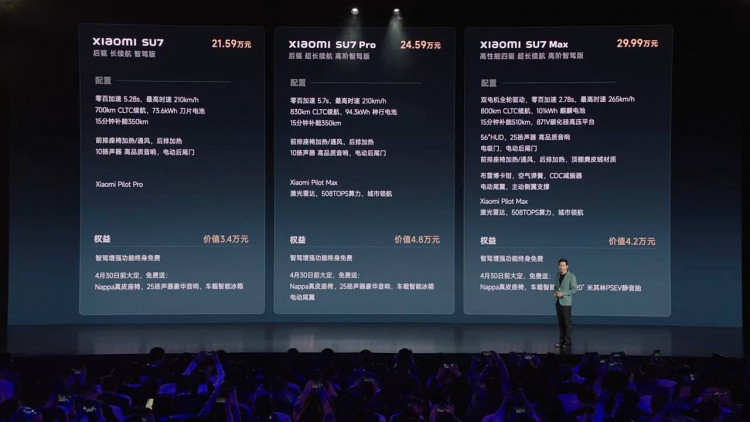On the evening of March 28, Xiaomi Corporation (01810.HK) officially launched its first electric sedan, the SU7, with the standard version priced at 215,900 yuan (about $30,408), the PRO long-range version at 245,900 yuan (about $34,019), and the MAX version at 299,900 yuan (about $41,490). Customers placing significant orders before April 30 can enjoy various complimentary configurations or intelligent driving system benefits.
The SU7 boasts dimensions of 4,997 mm long, 1,963 mm wide, and 1,440 mm tall, with a 3,000 mm wheelbase, meeting C-segment standards. However, considering the recent trend of domestic automakers using larger vehicles to compete with lower-tier joint ventures, the SU7 seems to be targeting the B-segment sedan market.
The all-wheel-drive, dual-motor MAX variant features a CATL (300750.SZ) ternary lithium battery on an 800V platform, achieving an 80% charge in 19 minutes. It boasts a peak power output of 495 kW and 383 Nm of torque, accelerating from 0 to 100 km/h in a brisk 2.78 seconds.
On the intelligent driving front, the SU7 offers highway NOA functionality at launch, with urban NOA planned for select Chinese cities later this year. The car boasts Xiaomi's self-developed (HyperOS) operating system, enabling a five-screen interactive experience. Additionally, the SU7 caters to specific scenarios with features like a rear-seat cooler/warmer, door handles designed for takeout bags, and spacious front and rear trunks.
Besides the previously announced Bay Blue, Olive Green, and Elegant Gray colors, the launch unveiled six new color options. The entire color palette is categorized into racing, luxury, fashion, and classic themes, with four interior color choices. Four wheel designs and three sizes are also available.
Prior to the launch, Lei Jun, CEO of Xiaomi, actively engaged on social media platforms. Pricing was a major industry concern.
"Xiaomi conducted competitor test drives for internal personnel, including the Zhiji LS6, Zhijie S7, XPeng P7, Jikr 007, and Tesla Model 3," revealed a Xiaomi employee.
On March 25, Xiaomi opened 59 stores across 29 Chinese cities, offering static vehicle experiences. High customer foot traffic indicated strong interest across various locations.
Regarding the SU7's sales expectations, Lei Jun expressed a pragmatic approach on March 27, 2024. "The auto industry is fiercely competitive," he said. "Xiaomi prioritizes realism, aiming for the top three positions in the premium electric sedan segment first. User experience is more important than sales figures. We want the SU7 to be recognized for its outstanding reputation."
Lei Jun further emphasized Xiaomi's long-term goal of becoming a top-five global carmaker within 15 to 20 years. "This is a marathon, a test of endurance and long-term strength," he said. "Xiaomi prioritizes the accumulation of core technologies."
Lei Jun has poured significant effort into Xiaomi's car project, even calling it his final entrepreneurial venture. To some extent, the success or failure of Xiaomi's car division could determine the fate of Xiaomi Corporation itself.
Xiaomi's foray into electric vehicles dates back a decade. In 2013, Lei Jun met with Elon Musk twice and became one of the earliest Tesla owners. Subsequently, Xiaomi, through Shunwei Capital and the Xiaomi Group itself, invested in various companies across complete vehicle manufacturing, battery technology, autonomous driving, and automotive components.
In March 2021, Xiaomi officially announced the approval of its intelligent electric vehicle business by the board of directors. The company pledged a $10 billion investment in the car segment within the next ten years, adopting a wholly-owned model to deliver a complete Xiaomi smart ecosystem, encompassing a wider range of intelligent living experiences. Xiaomi Auto was formally established in September of the same year, with Lei Jun at the helm as CEO. The core management team was built by recruiting talent from established car companies like BMW, Mercedes-Benz, and Geely.
"We've demonstrated our commitment to car manufacturing with real financial resources," Lei Jun declared.
Xiaomi's investment in the electric vehicle sector is rapidly expanding. Financial reports indicate that Xiaomi's research and development spending on new businesses like smart electric vehicles reached 3.1 billion yuan in 2022. This figure surged to 6.7 billion yuan in 2023 for smart cars and other innovative businesses.
Additionally, in 2023, stock compensation expenses related to innovative projects amounted to 800 million yuan. The increase in Xiaomi's R&D spending to 19.1 billion yuan in 2023, up 19.2% from the previous year, was primarily due to the expanded investment in smart electric vehicles and other innovative projects.






